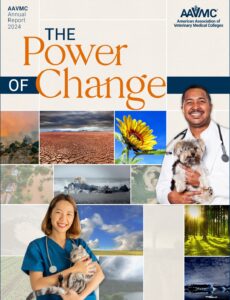MEDIA CONTACTS:
Jeff Douglas or Jeanne Johnson
Phone: 202/371-9195, x144
Email: jdouglas@aavmc.org or jjohnson@aavmc.org
WASHINGTON, D.C., January 25, 2021 — Dr. Juergen (Jürgen) A. Richt, from the Kansas State University College of Veterinary Medicine (KSU-CVM) is the recipient of the 2021 AAVMC Excellence in Research Award.
“The AAVMC’s annual series of professional awards recognize outstanding veterinary medical educators who excel in various areas of academic veterinary medicine,” said AAVMC Chief Executive Officer Dr. Andrew T. Maccabe. “Their dedication, achievements and contributions serve as a model of excellence for their colleagues and inspire new generations of veterinarians. We look forward to honoring Dr. Richt during our 2021 annual conference.”
The AAVMC Excellence in Research Award designates the outstanding veterinary medical researcher of the year, as selected by a committee of peers. The AAVMC Board of Directors established the annual research award in 2010 to recognize outstanding research and scholarly achievements in the field of veterinary medicine. It recognizes an individual who, over the course of his or her career, has demonstrated excellence in original research, leadership in the scientific community, and mentoring of trainees and colleagues in any discipline of veterinary medicine.
Dr. Richt is the Regents and University Distinguished Professor at KSU-CVM. Dr. Richt investigates zoonotic, emerging and transboundary diseases of livestock, focusing mainly on viral diseases. His work has led to strategies to identify, control and/or eradicate pathogens with significant impact on veterinary medicine, human health and food security.
In conjunction with his team at K-State, Dr. Richt is also the director of both the Center of Excellence for Emerging and Zoonotic Animal Diseases — which is funded by the Department of Homeland Security — and the National Institutes of Health COBRE Center on Emerging and Zoonotic Infectious Diseases.
His recent work focuses on the establishment of preclinical animal models for SARS-CoV-2 in order to evaluate the efficacy of vaccines and therapeutics for COVID-19. “(His) ability to rapidly mobilize collaborative research teams has been clearly demonstrated and translated into critical discovery during the COVID-19 pandemic,” KSU-CVM Dean Bonnie Rush and Professor Derek Mosier co-wrote in a nomination letter. They added, “We can think of no other single investigator who has had as significant an impact on veterinary comparative virology as Dr. Richt … Whether obtaining nasal swabs from Gobi Desert camels in Mongolia or executing a zoonotic viral challenge in biocontainment, Dr. Richt plans every detail and participates in every phase. By virtue of his passion for science and animals, the impact and timeliness of his work, and his extensive collaborations, he has raised the level of research for investigators across the globe.”
Dr. Richt is board certified in Veterinary Immunology and Serology and also Veterinary Microbiology by the German Veterinary Association. He received his Doctor of Veterinary Medicine degree (DVM) from Ludwig-Maximilians-University München, Munich, Germany, and his Ph.D. from the Justus-Liebig-University Giessen, Giessen, Germany.
His award will be presented during the AAVMC’s 2021 Annual Conference and Iverson Bell Symposium, which will be held virtually March 3-5, 2021.
Download a photo of Dr. Richt here.
ABOUT THE AAVMC
The member institutions of the American Association of Veterinary Medical Colleges (AAVMC) promote and protect the health and wellbeing of people, animals and the environment by advancing the profession of veterinary medicine and preparing new generations of veterinarians to meet the evolving needs of a changing world. Founded in 1966, the AAVMC represents more than 40,000 faculty, staff and students across the global academic veterinary medical community. Our member institutions include veterinary medical colleges and schools in the United States, Canada, Mexico, the Caribbean, the United Kingdom, Europe, Asia, Australia, and New Zealand as well as departments of veterinary science and departments of comparative medicine in the U.S.
– 30 –






SHARE